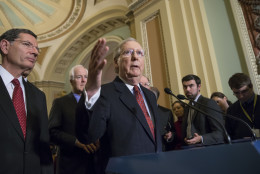National Treasury Employees Union
-
While a continuing resolution seems likely in the waning days of the short-term spending bill the government is currently operating under, federal employees once again have found themselves looking over their shoulders for any sign of a shutdown.
December 10, 2015 -
The increases go into effect January 2016. The executive order comes one month after the Federal Pay Agent finalized its recommendation that the President give about 102,000 federal employees locality pay raises.
November 30, 2015 -
Customs and Border Protection would be another loser in the legislation before the House. Customs user fees would go to unrelated transportation projects instead.
November 03, 2015 -
The No Bonuses for Tax Cheats Act would withhold bonuses from Internal Revenue Service Employees with a record of misconduct or tax delinquency.
October 29, 2015 -
The 9-year struggle to fill federal jobs in North Dakota's oil-boom towns offers a stark example to the rest of the government of just how hard it can be to keep federal workers when private employers beckon.
October 22, 2015 -
Congress passed a 10-week temporary funding bill on Wednesday to keep open the government. The House voted 277-151 on the measure. It now heads to the White House for the president's signature.
September 30, 2015 -
Reps. Don Beyer (D-Va.) and Rob Wittman (R-VA) introduced the Federal Employee Retroactive Pay Fairness Act, which would secure retroactive pay for all federal employees during a government shutdown, regardless of furlough status.
September 29, 2015 -
Reps. Chris Van Hollen (D-Md.) and Nita Lowey (D-NY) said there have been few bipartisan negotiations so far, and a new budget proposal from the Republican Study Committee has them particularly worried. Congress has until Sept. 30 to pass some sort of budget resolution that would keep the government open past the end of the month.
September 17, 2015 -
A new Senate bill could guarantee six weeks of paid leave for federal employees who become parents, and let them choose whether to take those six weeks separately or in one shot.
September 15, 2015 -
The National Treasury Employees Union, the Employee Thrift Advisory Council and 13 other organizations urged Congress not to use the Thrift Savings Plan — the federal government’s retirement savings program — as a revenue source.
September 10, 2015 -
The National Treasury Employees Union’s new president wants Congress to get serious about avoiding a government shutdown and funding the Internal Revenue Service.
August 26, 2015 -
The National Treasury Employees Union has a new president. Colleen Kelley stepped down after 16 years at the helm. Tony Reardon, formerly the union's national executive vice president, stepped into the top job. He joined the Federal Drive with Tom Temin with more on his new role.
August 26, 2015 -
Tony Reardon will ascend from his role as executive vice president to replace Colleen Kelley as the head of the National Treasury Employees Union.
August 12, 2015 -
Retiring NTEU president Colleen Kelley says she never considered herself a Beltway insider after living in the DC area for more than 28 years. She said she spent about half her time as president on the road, listening to federal employees voice their concerns. She said that's the best advice she can offer her successor once NTEU casts its votes next Tuesday.
August 05, 2015 -
The four-term president of the National Treasury Employees Union is stepping down. Colleen Kelley has been president for 16 years. She'll retire next week after the NTEU's annual convention. She jells In Depth with Francis Rose about some of her biggest accomplishments and challenges during her tenure.
August 04, 2015









